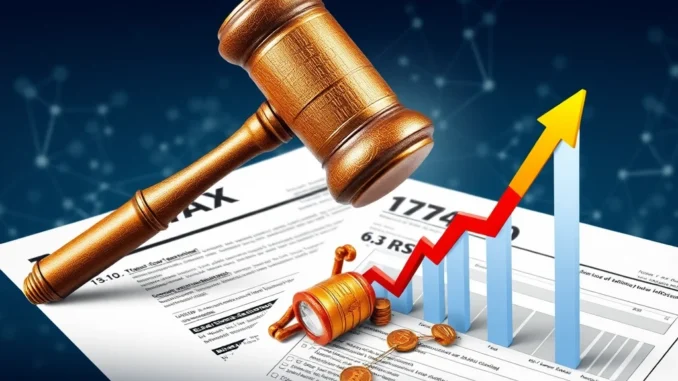
In a significant win for the cryptocurrency industry, the U.S. House of Representatives has delivered a powerful blow against what many considered an overreaching IRS regulation. A decisive vote of 292-132 saw lawmakers choose to overturn a controversial IRS rule targeting DeFi (Decentralized Finance) platforms. This rule, which mandated DeFi brokers to collect extensive taxpayer and transaction data, has been met with fierce resistance from the crypto community, citing impracticality and threats to innovation. Let’s dive into what this vote means for the future of DeFi and cryptocurrency regulation in the United States.
Why is the DeFi Broker Rule So Controversial?
The now-overturned IRS rule aimed to apply traditional broker regulations to the burgeoning world of DeFi. While the intention behind ensuring tax compliance is understandable, the practical application to decentralized platforms presented numerous challenges. Here’s a breakdown of the key issues:
- Compliance Nightmare: DeFi platforms, by their very nature, often operate without central intermediaries. Identifying who exactly is responsible for collecting and reporting data in a decentralized ecosystem is a major hurdle.
- Privacy Concerns: The rule demanded the collection of sensitive taxpayer and transaction data, raising significant privacy red flags within a community that values pseudonymity and decentralization.
- Innovation Stifling: Critics argued that the burdensome compliance requirements would disproportionately impact smaller DeFi projects and drive innovation overseas, effectively hindering the growth of the U.S. digital asset sector.
- Technical Impossibility: The decentralized and often anonymous nature of DeFi transactions makes it technically challenging, if not impossible, to adhere to traditional broker reporting standards.
These challenges led to widespread concern that the IRS cryptocurrency regulation, while perhaps well-intentioned in principle, was fundamentally incompatible with the realities of DeFi.
The House Vote: A Turning Point for Crypto Tax Policy?
The overwhelming bipartisan vote in the House to overturn the rule signals a potential shift in how lawmakers are approaching crypto tax policy. It suggests a growing recognition of the unique characteristics of digital assets and the need for more nuanced and practical regulatory frameworks.
Here’s what we know about the process and potential outcomes:
- Senate Approval Already Secured: The resolution to overturn the rule had already passed the Senate, indicating broad support across both chambers of Congress.
- Presidential Signature Expected: The resolution now needs to be approved again by both houses due to procedural reasons before reaching President Trump’s desk. He is widely expected to sign it into law, solidifying the overturn.
- Future Regulations in Question: Crucially, if enacted, this resolution would prevent the IRS from introducing similar regulations in the future. This offers a degree of regulatory certainty for the DeFi space, at least in the short term.
This vote can be viewed as a significant victory for proponents of digital asset innovation, who argued that the IRS rule posed an existential threat to the burgeoning DeFi sector in the U.S.
Arguments For and Against Overturning the Rule
While celebrated by many in the crypto space, the decision to overturn the DeFi broker rule is not without its detractors. Let’s examine the key arguments from both sides, as highlighted by CoinDesk’s reporting:
| Arguments for Overturning the Rule | Arguments Against Overturning the Rule |
|---|---|
|
|
What’s Next for DeFi and Crypto Regulation?
The overturning of this specific IRS DeFi broker rule doesn’t mean the end of cryptocurrency regulation, but rather a potential course correction. It opens the door for a more collaborative and informed approach to regulating this rapidly evolving space. Here are some potential next steps:
- Dialogue and Collaboration: The vote could encourage greater dialogue between regulators, industry players, and technology experts to develop more practical and effective regulatory frameworks for DeFi.
- Targeted Regulations: Instead of broad, sweeping rules, future regulations might focus on specific areas of concern, such as consumer protection or illicit activities, while allowing innovation to flourish.
- Technological Solutions: The industry and regulators may explore technological solutions that can facilitate tax compliance in a decentralized environment without compromising privacy or innovation.
A Powerful Message to Regulators
The U.S. House vote sends a clear and urgent message: regulations must be carefully considered and practically applicable to the unique nature of decentralized technologies. It highlights the importance of balancing tax compliance with the need to foster innovation in the burgeoning digital asset sector. While the debate on cryptocurrency tax policy is far from over, this vote represents a significant step towards a more balanced and informed regulatory landscape for DeFi and the broader crypto industry. The crypto community is watching closely to see what future approaches regulators will take, hoping for a path that encourages growth and innovation while addressing legitimate concerns about taxation and financial oversight.



